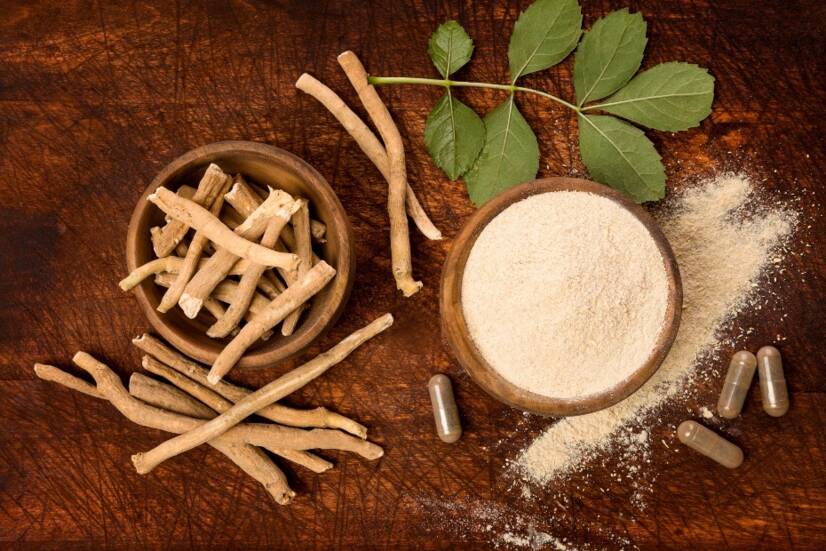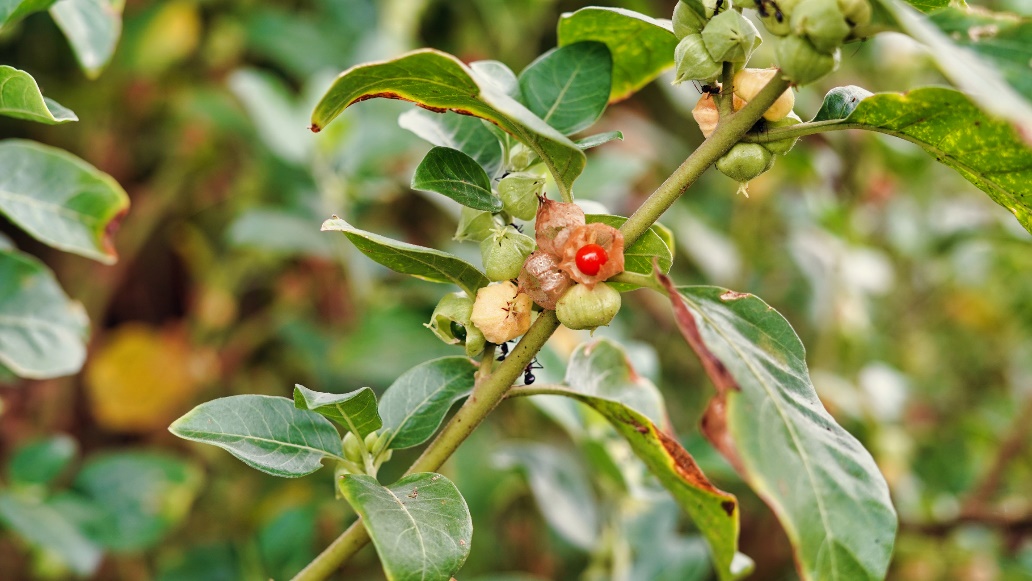- medicalnewstoday.com - What are the benefits of ashwagandha? Medical News Today. Debra Rose Wilson, Ph.D.
- healthline.com - 9 proven health benefits of ashwagandha. Healthline. Jillian Kubala, MS, RD
- MANDŽUKOVÁ, Jarmila. Herbs: the healing power of nature. Prague: Euromedia Group, 2020. ISBN 978-80-7617-918-9
- forbes.com - 7 science-based health benefits of ashwagandha. Forbes Health. Bindiya Gandhi, M.D.
Ashwagandha: What is it, what effects does it have on health + How to take it

Ashwagandha is an herb called Indian saffron. It is one of the most famous herbs in traditional natural medicine. It has gained its popularity due to its beneficial effects on male health and fertility.
What are its health effects on the body? Who should avoid it?
Characteristics
Ashwagandha literally means horse scent. It is characterized by its powerful or "horse" effect on health. It is an adaptogenic plant with beneficial effects on physical and mental health, immunity, the cardiovascular system and the reproductive system.
You can read the content, composition, effects, contraindications, dosage and use, home cultivation and many other interesting information in the article.
What is ashwagandha?
Ashwagandha is a subtropical to tropical plant growing up to 1.5 metres tall. It is found mainly in India and tropical countries of Asia, Africa and Europe. It has small yellow-green flowers, leaves and round orange-red berry-shaped fruits.
Its root is most commonly used, which is dried after collection and then crushed into a fine powder.
It is considered by many cultures to be one of nature's miracles due to its rich composition. It is one of the most widely used herbs in Ayurvedic medicine.
The ashwagandha plant can be obtained from us in various forms, especially as capsules, tablets, tea, powder or tincture.
Tea blend
A common use of the plant is to prepare tea. You can buy ready-made tea (loose/sucked) which you just pour hot water over, infuse and drink.
However, a more interesting option may be to make your own homemade tea from the dried plant.
Ground (crushed) powder
Ashwagandha can be purchased as a ground powder that contains its root. From the finished powder you can prepare a drink to your own taste. It is commonly mixed in water, fruit juice or even milk with honey.
Tincture
Another traditional form of using the plant is tinctures (liquid extract), which can be consumed in various ways. Tincture mixtures without added colourings and artificial sweeteners are recommended.
Capsules/tablets
Over-the-counter dietary supplements in capsule form usually contain an extract of the root of the plant. Tablets are taken orally on a regular basis according to the dosage prescribed by the manufacturer.

Contents and composition of ashwagandha
Ashwagandha has a strong presence in traditional medicine due to its high content of active compounds such as flavonoids, alkaloids, saponins, lactones, vitamins and minerals.
Flavonoids are known for their antioxidant and anti-inflammatory effects on the human body. Alkaloids are particularly beneficial in supporting the immune system and immunity when dosed appropriately.
Lactones are potent substances beneficial to the vitality of the body. They are effective in fighting cancer. Saponins are beneficial for immunity and cardiovascular support.
In addition, amino acids, phytoestrols, tannins and other beneficial active substances are found in ashwagandha. Of the vitamins, vitamin C is the most abundant, and of the minerals, iron and calcium.
Internal use
What are its effects?
Beneficial effects on the human body
Like other adaptogenic plants, ashwaganda helps the body to maintain homeostasis and thus the balance of the internal environment.
Overall, it has a beneficial effect on the immune system mental health. It has thyroid supporting effects, nervous system and male libido.
The best known effects of the ashvagandha plant
1. Promoting immunity and immunity
Ashwagandha contains a large amount of antioxidants, minerals and vitamin C that support the immune system.
The active ingredients in the herb have anti-inflammatory, antibacterial and antioxidant properties. They promote antioxidant activity that protects cells from free radicals and thus prevents oxidative stress.
Ashwagandha is also useful for promoting energy as well as overall vitality and strength of the body.
2. Supporting the mental state and nervous system
Ashwagandha is best known for its ability to reduce stress and improve current mental state. Some studies point to its medicinal effects against anxiety and depression.
The plant combats anxiety, stress and emotional tension, depression and works to calm the mind overall. It regulates or reduces levels of the hormone cortisol.
Promotes brain function, improves concentration, promotes memory with focus. Some studies suggest that ashwagandha may alleviate problems with memory and brain function.
The plant has also been the subject of research into supportive treatments for epilepsy.
3. Fertility and testosterone support in men
Ashwagandha is particularly known for its powerful effects on testosterone levels and sexual health in men.
Some research points to a link between the use of ashwagandha and an increase in sperm count and motility, and ultimately an increase in testosterone levels.
Ashwagandha is also a natural aphrodisiac that promotes sex drive and libido. It also helps to improve blood circulation to the genital tract, pelvic area in both men and women. This has a beneficial effect against infertility.
4. Effect on the cardiovascular system
Another effect is to support the cardiovascular system. The plant promotes the reduction of blood pressure, bad LDL cholesterol and blood sugar levels.
Ashwagandha can help improve the strength of the blood vessel walls and blood circulation as well as the blood supply to the tissues in the body. Due to its high iron content, it works to increase the number of red blood cells.
5. Anti-cancer potential
Studies have shown that ashwagandha inhibits the growth of cancer cells and helps induce the programmed death of cancer cells, technically called apoptosis. This effect is mainly attributed to steroidal lactones, referred to as withanolides.
Ashwagandha has therefore been the subject of research to support the treatment of certain types of cancer.
6. Supporting metabolism and muscle mass
Positive results have also come from research that has shown that ashwagandha promotes muscle growth while aiding muscle recovery. It supports energy metabolism and fat burning.
Ashwagandha can also help with thyroid hypofunction (the inability to produce sufficient amounts of hormones).
Summary of possible effects of ashwagandha:
- Strengthening the immune system and immunity
- Anti-inflammatory effect
- Antioxidant effect
- Promoting the vitality of the body
- Lowering LDL cholesterol
- Lowering blood pressure
- Lowering blood sugar levels
- Supporting the cardiovascular system
- Support memory and learning
- Support brain activity
- Calming the mind
- Antidepressant effect
- Regulation of cortisol levels
- Promoting quality sleep
- Support energy metabolism
- Stimulation of thyroid function
- Supporting the growth of muscle strength
- Support testosterone production
- Support fertility and libido
- Blood circulation to the small pelvis
- Aphrodisiac effect
Harvesting and storage
Home growing of ashwagandha
Although this herb is of subtropical origin, it can be grown at home under certain conditions.
Ashwagandha is not a hardy plant and therefore needs to be protected from frost.
You can grow it in a pot in a warm apartment or in a specially heated greenhouse. Sufficient sunlight is essential for growing ashwagandha indoors and outdoors.
Sow the seeds especially in spring. During the warmer weather in summer, you can also leave the plant outside. Towards the end of the summer, it should be moved indoors or to a warmer environment.
Sufficient moisture and fertilisation with organic fertiliser is essential.
The ashwagandha shrub can be up to 1,5 metres tall. It is necessary to have enough space for the roots, which can be provided by a large pot. Subsequently, the root of the plant is mainly used.
Who, on the other hand, should be vigilant when taking ashwagandha?
Based on official provisions and current clinical studies, there is no set daily dose.
The recommended dosage of the ashwagandha plant depends on the specific type of dietary supplement and therefore the manufacturer's instructions should be followed.
The root extract in capsule form containing approximately 400-500 mg (maximum) is taken once daily.
For the plant root and ground powder, the usual dose is 2-5 g per day. Purchased tea and tea blend is taken as directed, but approximately 1 to 2 cups per day.
In the case of tinctures, 1 drop per 1 kg of body weight per day can be taken. Some ready-made tinctures already have a limited and precise dosage.
However, some individuals should not take ashwagandha. This applies to pregnant and lactating women.
Pregnant and lactating women should not take ashwagandha in any form because of the effects. The same applies to children.
Patients with thyroid disease should be vigilant when taking ashwagandha as it can stimulate the activity and levels of thyroid hormones.
It may also lower blood sugar and blood pressure. Therefore, extra caution should be taken when taking medicines to control blood pressure or diabetes (diabetes mellitus).
People usually tolerate ashwagandha in small to medium doses without problems. On the other hand, taking large amounts of this plant may lead to some digestive problems, diarrhea or nausea, due to irritation of the lining of the digestive tract.
In some individuals, prolonged use may cause fatigue and drowsiness. Rarely, an allergic reaction may also occur.
In case of any adverse reactions, do not take ashwagandha further and consult your doctor about your health condition.
Interesting resources
Related










